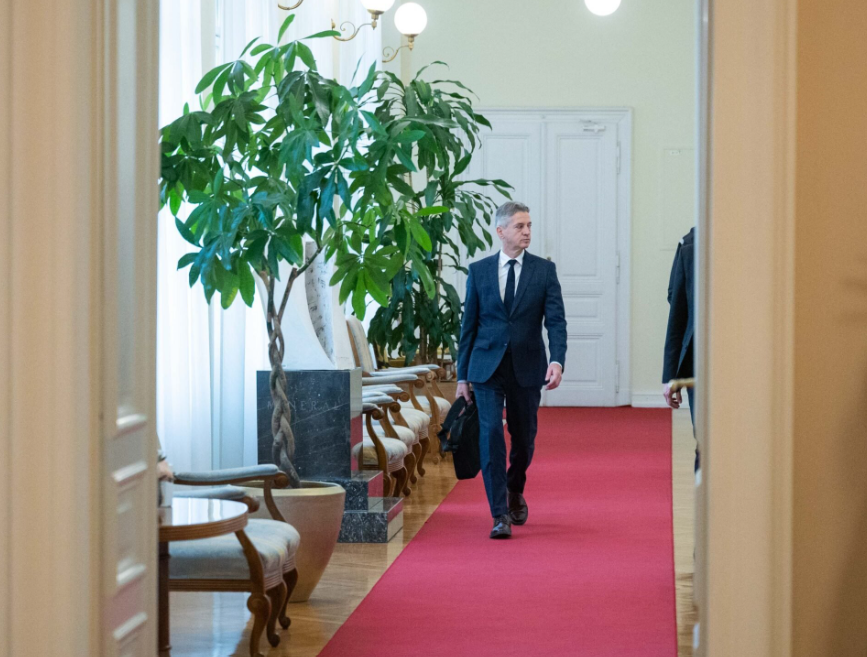By: Ž. K. (Nova24tv.si)
The recent testimony of the former Minister of the Interior and the former Acting Director-General of Police in the National Assembly has once again confirmed the Prime Minister’s political interference in the work of the police. But it is not only the police who Golob and his associates allegedly interfered with, but also the Slovenian informants in the Slovene Intelligence and Security Agency (SOVA). In fact, last year, Golob allegedly requested that the arrest of two Russian spies be postponed, which, according to lawyer Dr Rajko Pirnat, has the elements of a criminal offence.
The testimony of former Minister of the Interior Tatjana Bobnar and former Acting Director-General of the Police, Boštjan Lindav – specifically the part of the testimony which took place behind closed doors, at the meeting of the Commission of Inquiry, will be followed by a session of the Commission for the Supervision of the Intelligence and Security Services (KNOVS). “From this, it is possible to understand that the Prime Minister has used his political influence on the concrete procedures of work of the intelligence and security services,” said Vida Čadonič Špelič. The New Slovenia party (Nova Slovenija – NSi) MP announced the convening of an extraordinary session of the Commission for the Supervision of Intelligence and Security Services.
The Slovene Intelligence and Security Agency, in cooperation with the National Bureau of Investigation, had planned to arrest the two spies on the 28th of November, but as this would have overshadowed the celebration of the government’s victory in the triple referendum (amendments to the Radio-Television Slovenia Act, the Government Act and the Long-Term Care Act), the arrest then took place a week later, on the 5th of December, reports the Delo newspaper.
From the Intelligence and Security Agency to Muženič
According to the testimonies of Bobnar and Lindav, Golob gave orders to the Director of the Intelligence and Security Agency, Joško Kadivnik, and then the orders were passed on. The head of the National Bureau of Investigation, Darko Muženič, was the next to learn of the Prime Minister’s instructions, and he then informed the former Acting Director-General of Police, Boštjan Lindav, about the postponement of the arrest. The Slovene Intelligence and Security Agency did not comment substantively on the disclosures to the media.
According to the testimony given in the National Assembly, the government side has, therefore, explicitly put political interests before the interests of state security. The celebration of the adoption of laws that “depoliticised” the national media outlet, increased the size of the government, which the Prime Minister now wants to reduce again, and the delay in the implementation of long-term care took precedence over everything else. It even came before the fundamental task of the state, which is to ensure the safety of its citizens.
The revelation has sparked widespread public outrage that transcends politics. For example, former Minister of Justice Aleš Zalar of the Liberal Democracy of Slovenia (Liberalna demokracija Slovenije – LDS) party wrote: “This is a very serious accusation, which will have to be supported by credible and convincing evidence. This case will be the basis for political spears to be broken on the survival or downfall of the entire government.”
A two-month delay
At the end of January this year, the public learned that the Slovene Intelligence and Security Agency, together with the National Bureau of Investigation, had discovered and arrested two Russian spies with a delay of two months. The couple and their family lived in Črnuče and rented a small office on Parmova Street in Ljubljana. The two spies had foreign (Argentinian) citizenship and were operating in Slovenia under false identities. When the news of the arrest finally got out, the government side proclaimed the arrest as possibly the biggest success of the Slovene Intelligence and Security Agency so far. The English media outlet The Guardian later reported that the two Russian spies may have been involved in an exchange of captured spies.

